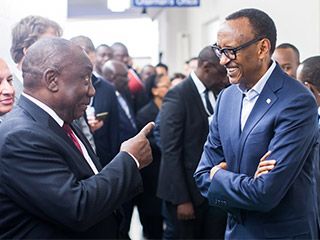
Cyril Ramaphosa, the President of the Republic of South Africa, talks with Paul Kagame, the President of Rwanda, at the Annual Meeting of the World Economic Forum in 2019. (Image courtesy of World Economic Forum on Flickr. License CC BY-NC-SA.)
Instructor(s)
Prof. M. Amah Edoh
MIT Course Number
21G.025
As Taught In
Spring 2019
Level
Undergraduate
Course Description
Course Features
Course Description
This course considers how, despite its immense diversity, Africa continues to hold purchase as both a geographical entity and meaningful knowledge category. It examines the relationship between articulations of "Africa" and projects like European imperialism, developments in the biological sciences, African de-colonization and state-building, and the imagining of the planet's future. Readings in anthropology and history are organized around five themes: space and place, race, representation, self-determination, and time.


